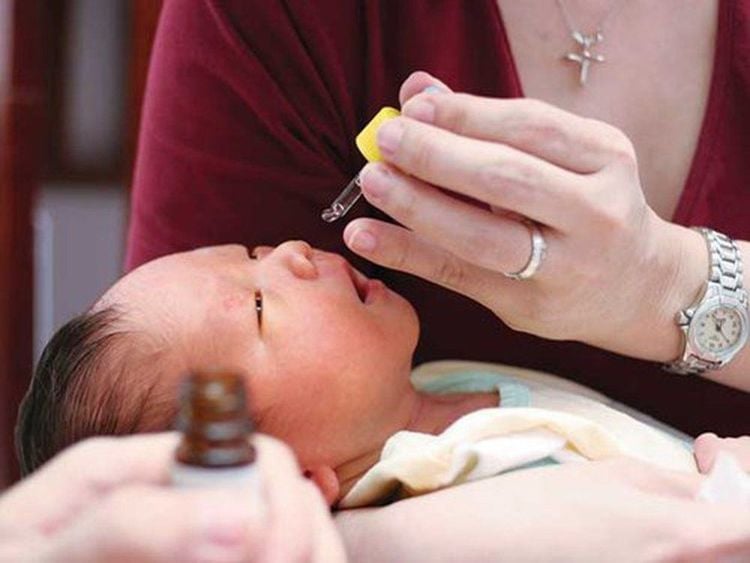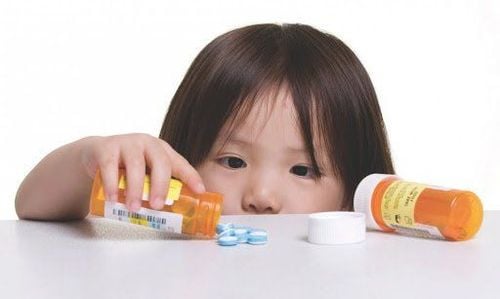This is an automatically translated article.
The article was professionally approved by Master, Doctor Dang Huy Toan - Department of Pediatrics - Neonatology - Vinmec Nha Trang International General HospitalMedicines for colds and flu can be dangerous for babies and toddlers. Therefore, mothers should note that only using the drug as prescribed by the doctor. Commonly recommended ways to treat a baby's stuffy nose are saline spray, steam inhalation, raising the head of the bed, drinking plenty of fluids, and teaching the child to blow his nose.
1. Causes of stuffy nose in babies and toddlers
Nasal congestion occurs when the blood vessels and tissues in the nasal cavity contain too much fluid. It can make it difficult for your baby to feed, have trouble sleeping, and increase the risk of serious medical conditions like sinusitis.Distinguishing between viral and bacterial infections can be done by observing the color of the mucus. In viral infections, the mucus is initially clear, in some cases white, green, or yellow, before turning transparent.
In addition, the cause of a stuffy nose in babies can also be due to allergies, it is necessary to visit a doctor to test for allergy diagnosis.
Nasal congestion can even occur when a food sample or other object gets stuck in a child's nose. For this reason, you also need to take the child to the hospital to remove the foreign body from the child's nose, do not try to do it yourself.
If there are other symptoms, especially fever and thick, yellow mucus, seek medical attention as soon as possible.

Nghẹt mũi xảy ra khi các mạch máu và mô trong khoang mũi chứa quá nhiều dịch lỏng
2. Treatment of stuffy nose in babies and toddlers
2.1. Physiological saline spray or nasal drops One of the safest and most effective ways to treat a baby's stuffy nose is a saline spray or nasal drops. These products can be purchased without a prescription.If you use drops, put two drops in each nostril to loosen the mucus inside. Then use a suction bulb immediately afterwards to drain the saline and mucus. You can place a rolled up towel under your child's shoulder so that he can gently tilt his head back a little, making sure the drops get to his nose.
Squeeze the gourd before putting it on the nose. That way, when you release the balloon, it will suck out mucus from the inside. If you squeeze the balloon once it's inside the nostril, it will create an air current that pushes the mucus deeper into the nasal cavity.
Squeeze out all the mucus inside the gourd onto a paper towel.
Optimal time is around 15 minutes or so before feeding and at bedtime to help baby breathe easier when feeding, bottle-feeding or going to bed.
Avoid using saline solutions containing drugs, just drop or spray physiological saline. You also need to pay attention to make sure to wash and dry the suction bulb after each use.

Một trong những cách an toàn và hiệu quả nhất để điều trị nghẹt mũi cho trẻ là xịt nước muối sinh lý
To prevent mold and bacteria from growing in the appliance, change the water daily and clean and dry the heater according to the manufacturer's instructions.
A warm bath in the bathroom is also a good way to relieve a baby's stuffy nose. Make sure your child breathes in the moisture in the bathroom under your close supervision.
Do not put hot water in the humidifier to spray moisture because it may cause burns.
2.3. Elevating the head of the child's bed Elevating the head of the bed to relieve nasal congestion in children is only recommended for children 2 years of age and older. For younger children, you need to avoid placing pillows and other soft items on the child's bed to minimize the risk of SIDS (sudden infant death syndrome).
To raise the head of the bed, you can place a pillow or rolled towel under the mattress. Never raise your baby's head by placing an extra pillow under the baby's head as this increases the risk of SIDS.
2.4. Drink plenty of water to relieve congestion for children Encourage children to drink more water because fluids help thin mucus. However, you should not force your child to drink water. Even if your child only sips a little water during the day, it helps.

Nâng cao đầu giường để giảm nghẹt mũi cho trẻ
In summary, infants and young children are very susceptible to respiratory problems, respiratory infections, skin diseases and gastrointestinal infections... parents need Special attention is paid to the care and provision of adequate nutrition for children. The pediatric department at Vinmec International General Hospital is the address for receiving and examining diseases that infants and young children are susceptible to: viral fever, bacterial fever, otitis media, pneumonia in children. , cold... With a system of modern facilities, medical equipment, sterile space, minimizing the impact as well as the risk of disease spread, Vinmec will bring satisfaction to you. customers and are highly appreciated by industry experts with:
In addition, parents should also add some supporting foods containing lysine ingredients, essential micro-minerals and vitamins such as zinc, chromium, Se flu.
Lysine is very necessary for the development of children, Lysine promotes the production of digestive enzymes to stimulate children to eat better and digest easily and effectively, increase food metabolism, maximize absorption of nutrients. Nutrition from food.Strengthening lysine for babies helps the body create antibodies, develop resistance to help reduce cough, thin phlegm in children.
Parents can learn more:
Why do you need to supplement Lysine for your baby?
Please regularly visit Vinmec.com website and update useful information to take care of your baby and family.
Please dial HOTLINE for more information or register for an appointment HERE. Download MyVinmec app to make appointments faster and to manage your bookings easily.
Reference source: webmd.com












